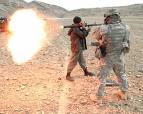War Related Post Traumatic Stress: An Issue of Human Preservation and Consciousness

by Dr. Hakim
I believe the medical community has made a mistake in considering war-related post-traumatic stress a disorder.
War related post-traumatic stress is a natural order, not a disorder.
I speak as a general medical practitioner, not as a psychiatrist. But more importantly, I speak as a human being whose thinking about war trauma transformed in the few minutes that I was interviewing Faiz Ahmad a few years ago, and then recently in interviewing Nao Rozi, an Afghan National Army veteran.
Anyone who witnesses gruesome violence and death would feel nauseous and repulsed, and these reactions are a natural order of human preservation, not a disorder.
War-related post-traumatic stress prompts us to avoid the blood and gore of mutual killing. Collecting and hearing all the stories of war veterans should prompt us to seriously abolish wars. Albert Einstein had said, “War cannot be humanized, only abolished. War is a terrible thing, and must be abolished at all costs. “
Nao Rozi had painted for me a morbid scene that poets and writers have consistently described in different ways over the centuries, “There were so many dead young bodies, and all of them were strangers to me. I thought, ‘Why did we do this to one another? Who benefited from these deaths? Weren’t their mothers waiting for them at home?’ ”
These questions changed the course of his life.
While making sense out of what he had experienced, he had tried to kill himself a few times.
Today, there is an on-going suicide epidemic among U.S. soldiers and veterans.
A portion of the Guardian article which touched on this suicide epidemic among U.S. soldiers is worth reproducing here.
Libby Busbee is pretty sure that her son William never sat through or read Shakespeare’s Macbeth, even though he behaved as though he had. Soon after he got back from his final tour of Afghanistan, he began rubbing his hands over and over and constantly rinsing them under the tap. “Mom, it won’t wash off,” he said.
“What are you talking about?” she replied.
“The blood. It won’t come off.”
On 20 March 2012, the soldier’s striving for self-cleanliness came to a sudden end. That night he locked himself in his car and, with his mother and two sisters screaming just a few feet away and with Swat officers encircling the vehicle, he shot himself in the head.
At the age of 23, William Busbee had joined a gruesome statistic. In 2012, for the first time in at least a generation, the number of active-duty soldiers who killed themselves, 177, exceeded the 176 who were killed while in the war zone.
Tomas Young, an Iraq veteran who has decided to end his life, wrote a letter to Mr. Bush and Mr. Cheney stating “My day of reckoning is upon me. Yours will come. I hope you will be put on trial. But mostly I hope, for your sakes, that you find the moral courage to face what you have done to me and to many, many others who deserved to live. I hope that before your time on earth ends, as mine is now ending, you will find the strength of character to stand before the American public and the world, and in particular the Iraqi people, and beg for forgiveness.”
In the words of Erica Modugno, author of a pledge some veterans are making to dying Tomas Young:
“We see you. We hear you. We will not remain passive. We will not be silent.
Farewell, Tomas, and thank you.”
I’m sad that some of us may still conclude that Nao Rozi, William Busbee and Tomas Young were ‘wimpy soldiers’, not brave enough to unflinchingly continue doing their jobs.
Rather, their post-traumatic stress was a natural order seeking to preserve their good conscience, a kind order that can help us find a better world.
Dr. Teck Young Wee, a Singaporean medical doctor, has been involved in health and development work in Afghanistan since 2004. The name he uses, Hakim, was given to him by Afghans he served in refugee camps. In the Dari language, “Hakim” means “local healer.” He now lives and works in Kabul establishing small social enterprise and is a friend-mentor of the Afghan Peace Volunteers. (ourjourneytosmile.com)

